Health
COVID-19: Handwashing Adherence Drops by 93% in Kampala Hotspots
Published
5 years agoon
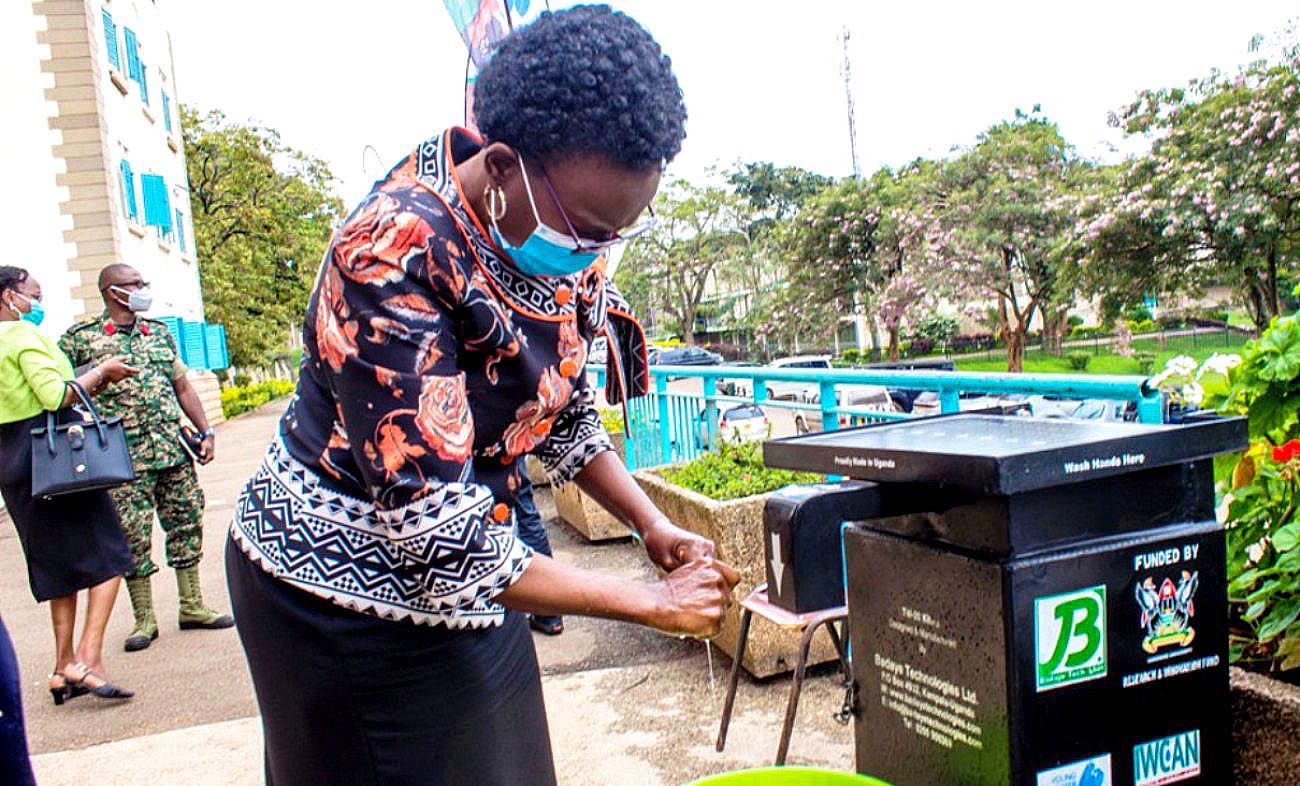
By Joseph Odoi
As Uganda continues to fight tirelessly to control the spread of COVID-19, results from a field-based survey in Kampala’s informal settlements have indicated that citizens have abandoned hand hygiene, a key pillar in stopping the spread of a virus.
To beat the virus today and ensure better health outcomes beyond the pandemic, hand hygiene, especially through handwashing with soap have been emphasized as a top priority.
But results of a study titled: Adherence, Lived Experiences and Resilient Transformation among “slum dwellers” (ALERTs) in COVID-19: A study of Ki-Mombasa and Kabalagala-Kataba slums in Kampala present an urgent need to intervene in these communities in order to improve public hygiene practices such as handwashing, if the intended objectives are to be achieved.
Dr. Gloria Seruwagi, a behavioural scientist at Makerere University School of Public Health has observed that some of the set Standard Operating Procedures such as physical distancing, regular sanitizing and use of face masks are less likely to be followed and implemented due to congestion in the settlements.
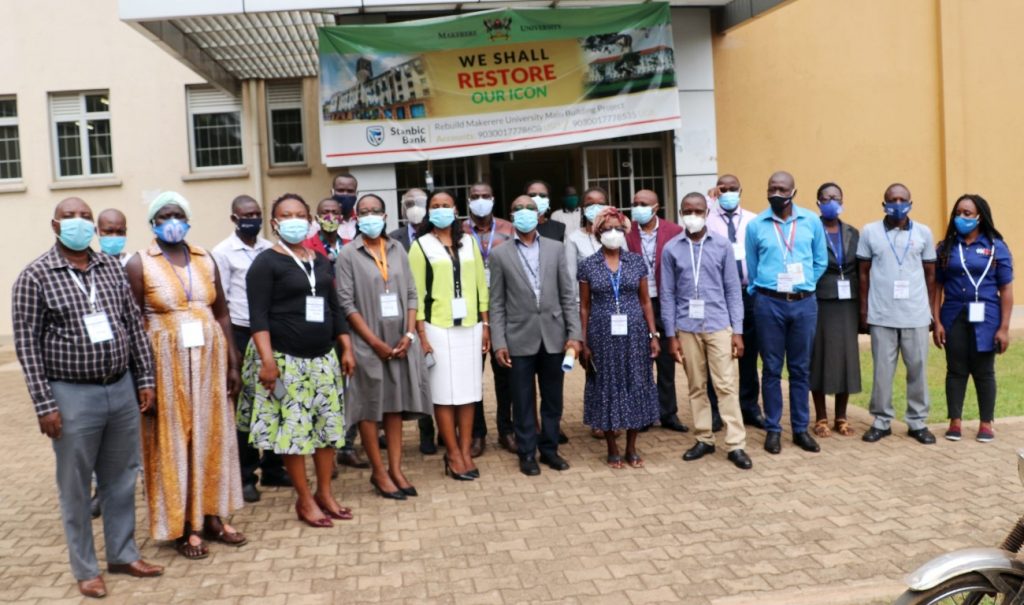
While presenting an overview of results from the study, Dr. Seruwagi said Ugandans had gone back to their old ways and abandoned best hygiene practices such as handwashing, which is critical in the fight against COVID-19.
“Residents say they can’t afford masks and those who have them say masks make breathing uncomfortable. Sanitizing is a luxury to most people in Bwaise and Kataba communities. While the practice of handwashing was feasible and adhered to at the beginning of March, it has drastically dropped by up to 92.6%.
Dr. Seruwagi, who is also the Study Principal Investigator observed that residents of Ki-Mombasa and Kabalagala-Kataba still have a major infodemic challenge of misinformation surrounding COVID-19, also exacerbated by multiple power centres and enforcers who locals say give confusing messages and seemed to have an uncoordinated response strategy.
“The community told us that everyone seems to be a “little king” in enforcing COVID SOPs and guidelines – from the police to Division leaders, food distributors, VHTs and local village leaders. They were not working in harmony and were giving different, sometimes confusing, messages and instructions. This greatly contributed to confusion and partly resulted in community noncompliance” she said.

According to Hilda Namakula, ALERTs study Co-Investigator people living in informal settlements had vast knowledge of COVID-19 signs, symptoms and how it is spread.
For instance, in this study, up to 82% mentioned high fever as a symptom while 80.2% mentioned sore throat as a symptom. Meanwhile 80.8% knew that sneezing and coughing were symptoms and 78% mentioned body pain.
Despite this knowledge, Namakula contends that communities have multiple – and sometimes contradictory – sources of information which affect their adherence to the preventive measures.
“In Kampala, TV takes lead as the main information source at 78%, social media 14%. Other sources include radio, family members and neighbors. In addition to multiple information sources, multiple enforcement authorities in Ki-Mombasa and Kabalagala-Kataba have contributed to confusion on which information to follow.’’ said Ms. Namakula.
In a bid to establish reasons for non-compliance to COVID-19 SOPs such as physical distancing or staying home, researchers also found that livelihoods and the need to make a living were the most common explanatory factors.
“Other reasons for non-compliance include perceptions that COVID-19 is a political ploy, declining enforcement and multiple implementers with confusing messages and warring power centres. Moreover, in their power struggles, the different actors who were enforcing SOPs were themselves not adhering for example by wearing masks” Namakula added.
According to the study, communities reported lot of myths and misconceptions about COVID-19 as key drivers of high risk behaviour. For example; people living in Kampala’s informal settlements believe that taking alcohol reduces the risk of infection (16.8%); that sunbathing protects against COVID-19 (47.9%); and that Africans are immune by virtue of their skin Colour (46.5%).

Following the survey findings, Makerere University researchers underscored the need for sustainable community-led interventions to minimize the pandemic implications. The researchers observe that the current efforts to contain the pandemic cannot yield better results unless there is harmony and consistency in messages shared out.
The project team set out to engage health workers and community leaders of Ki-Mombasa Bwaise and Kabalagala-Kataba slum communities to jointly co-design tailored interventions on Thursday 17th December 2020. The engagement climaxed with a dialogue held at Makerere University Central Teaching Facility (CTF-1) with key stakeholders in attendance, including representatives from Makerere University, Kampala Capital City Authority (KCCA), Division and political leaders, Village Health Teams (VHTs), community, administrative leaders, religious leaders among others.
Following presentation of findings, there was consensus from all participants that it was still possible to reverse the non-adherence and high-risk behaviour.
The stakeholders identified priority areas for interventions underscoring the need for community leaders (Village Chairperson, VHTs) to be at the forefront. The co-design process comprised proposals for re-adaptation of some existing interventions or focusing more on some than others (e.g. emphasising wearing facemasks vs. social distancing); and practical ways for operationalizing the Community Engagement Strategy (CES) amidst increasing community transmission; designing a community behavioural change communication component; as well as undertaking joint rigorous resource mobilisation at the next phase to implement some of the proposed interventions.

Government of Uganda through the Ministry of Health launched the National Community Engagement Strategy (CES) for COVID-19 Response in October 2020. This strategy arose from the need to stem the wide spread community transmission amidst low levels of compliance to the COVID-19 SOPs.
This strategy puts responsibility to community individuals, local leaders, households and communities to take charge and ensure optimal compliance. The CES also spells out the key role of VHTs, other local leaders the roles of the proposed village health Taskforce (VTF) and expected outcomes.

This study is funded by the Government of Uganda, through the Makerere University Research and Innovation Fund (MakRIF). The ALERTs study is dual-pronged and phased in implementation that combines an innovative citizen science approach with a participatory project co-design phase.
Ms. Carol Kamugira, a Mak-RIF representative applauded the research team for being innovative and bringing community members to devise community-led sustainable solutions in the fight against the coronavirus.
“It is the first time I have seen this kind of arrangement, bringing real community members to co-design interventions here at the university. Such interventions will be successful because they came from the people concerned and who will monitor the process. As the RIF we are very proud of Dr Seruwagi and her team and that is why we are here to support such meaningful studies. The government gave us resources, we advertised and received many research proposals. The proposal for this research was among those selected for funding because it was strong and very innovative,” Ms. Kamugira said.
She hailed the Uganda Government for the support rendered towards research and other training needs at Makerere University.

Other Key Findings
• The living arrangements in the informal settlements affect people’s adherence to SOPs like social distancing –emphasis should be on encouraging them to adhere to the other more plausible measures like hand washing or wearing masks.
• The participants reported doing the following often: the washing of hands with water (38.3%); washing hands with water and soap (33%); covering the mouth while sneezing/coughing (28.5%); using a mask while in a public place (32.2%); consumption of fruits (25.8%); regular drinking of water (35.5%).
• A big proportion of the study participants knew that chronic illness increases the risk of death from COVID-19 (81%); and that those infected with the disease should be isolated (93%).
• While children living in informal settlements were aware of COVID-19, they are generally not adhering to the SOPs because it is believed that their age group is not at risk.
• COVID-19 has increased levels of violence, including violence against children and SGBV. It has also significantly contributed to increased cases of defilement, early marriages, teenage pregnancy and pimping children for transactional sex. For example, forced sex among the respondents during lockdown was reported at 2% and slapping 4%.
• The study also revealed that some men are survivors of violence whose condition has been worsened by COVID through not having an income source and depending on their wives who job is commercial sex work (CSW). Other men are clients of CSWs who target them claiming nonpayment; or their husbands who don’t want clients sleeping with their partner.
• Study findings also highlight some adults, including parents, local leaders and law enforcement officers as being more collusive than supportive in cases involving violence against children.
• Local duty bearers and key stakeholders in child protection such as social workers and police officers need more support to effectively undertake their roles in child protection and wellbeing.
• Schools remain both a cognitive and physical safe space for children. The closure of schools presented heightened vulnerability for children as they became more exposed, over prolonged periods of time, to multiple rights violation including lack of food and all forms of violence. Nearly all children in study sites are not benefitting much from the Education Continuity Programme and most caregivers were not in position to support learning during school closure. Children wanted to return to school and worried about an uncertain future.
• There is also evidence of belief of the politicization of COVID-19 for example the impression that the related measures are intended to curtail the activities of the opposition politicians.
• Slum communities reported limited knowledge and access to COVID-19 testing services in their communities or within Kampala as a whole.
Recommendations:
The researchers recommend that, building on from its massively successful awareness campaign on COVID-19, government should now work on addressing the barriers of non-compliance; emphasising personal responsibility and the community’s own contribution in the fight against COVID-19.
Moving forward, the researchers recommend that:
1. Government and all stakeholders should focus on addressing the drivers of non-compliance and enforcement fatigue. These drivers include:
- The feasibility of interventions: Guidelines like physical distancing are not feasible in crowded informal or slum settings and need to be revisited. Emphasis should be placed on feasible ones like hand washing and masking.
- Myths and negative perceptions: Majority of the community has not fully bought into the seriousness ofCOVID-19 and think it is not only a joke but is also a political and monetary ploy advanced by politicians, some scientists and supremacists or population control enthusiasts. These myths need to be addressed.
- Shielding community from the reality of COVID as cases are managed out of the community. More profiling of COVID-19 trends and cases should be undertaken for behavioural change impact. However, stigma and other potentially related dilemmas should be carefully managed.
- Leaders, implementers and enforcers of COVID-19 guidelines should be consistent and “walk the talk”.
2. The issue of livelihoods and food security must be resolved as a key bottleneck to compliance.
3. Innovative multi-sectoral and tailored approaches should be adopted to address COVID-19 effects, including violence against children, men and women.
4. Children and adolescents should be effectively targeted in COVID-19 interventions. They need awareness, products (e.g. fitting face masks), voice and protection from the effects of COVID-19 including being witnesses and victims of different forms of violence.
5. Local and community leader and grassroots organisations should be recognised and engaged more in behavioural change campaigns – for instance to engage their communities identify alternative social norms for greetings, for showing love and kindness etc., without putting their lives at risk.
6. The timeliness and critical role of the recently launched Community Engagement Strategy should be leveraged. Local health system capacity should be strengthened and equipped to effectively take up the implementation and enforcement of SOPs for COVID-19 prevention. Equip community health systems and other enforcement structures with the knowledge, required supplies and supportive infrastructure.
Mak Researchers-Slum Communities Designing interventions
In this dissemination, Makerere University researchers and slum community leaders and journalists engaged in co- designing behavioural change interventions to address COVID-19. The results of these sessions will form the final part of the ALERTs study objectives and will be presented in its final reporting. However, some of the suggested “quick” solutions from the groups include:
- Involvement of women in sensitization drives around COVID-19
- Preventive treatment of suspected cases
- Skilling of Youth at Village Level
- Health Education
- Incorporating church leaders in the fight against COVID-19
- Politicians should incorporate COVID-19 Messages in their campaigns
- There is need for VHT support to counter community Spread
- Cultural leaders should join the sensitization
- Incorporate Youth Leaders in awareness
- Have local leaders and Police enforcing directives
- Incorporate NGOs in the fight against COVID-19
- Employ musicians in COVID-19 since they have a huge following
- There is need to incorporate drama and plays with key messages highlighting COVID-19 dangers and how to fight it.
More about the Study
The ALERTS Study was conducted by researchers from Makerere University and Gulu University with funding by Government of Uganda through the Makerere University Research Innovation Fund (MakRIF).
The total number of study participants was 807 in two slum communities of Kampala i.e. Kataba-Kabalagala-Kataba in Makindye and Ki-Mombasa Bwaise in Kawempe Division.
The Study Team:
1. Dr. Gloria Seruwagi – PI, Makerere University
2. Prof. Stephen Lawoko – Co-Investigator, Gulu University
3. Catherine Nakidde Lubowa – Co-Investigator, CHASE-i
4. Hilda Namakula – Co-Investigator, CHASE-i
5. Dr. Eric Lugada – Co-Investigator, CHASE-i
6. Daniel Magumba – Coordinator, Makerere University
7. Flavia Nakacwa – Administrator, Department of Social Work and Social Administration, Makerere University
Article originally posted on MakSPH
You may like
-


Makerere Graduation Underscores Investment in Africa’s Public Health Capacity
-


Makerere’s 76th Graduation Ceremony: CHS showcases research strength with 26 PhD Graduates
-


Mak 76th Graduation Ceremony: CoNAS Presents 16 PhDs & Best Performing Male Student in the Sciences
-
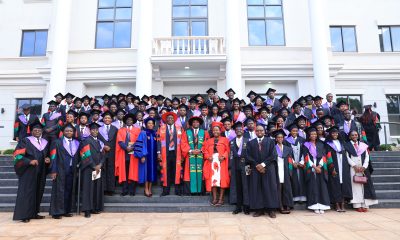

Mak 76th Graduation kicks off: SoL hailed as a Centre of academic Excellence
-


CAES Presents Overall Best Performing Student in the Sciences & a Record 28 PhDs at the 76th Graduation Ceremony
-


Over 9,200 to graduate at Makerere University’s 76th Graduation
Health
Makerere Graduation Underscores Investment in Africa’s Public Health Capacity
Published
23 hours agoon
March 4, 2026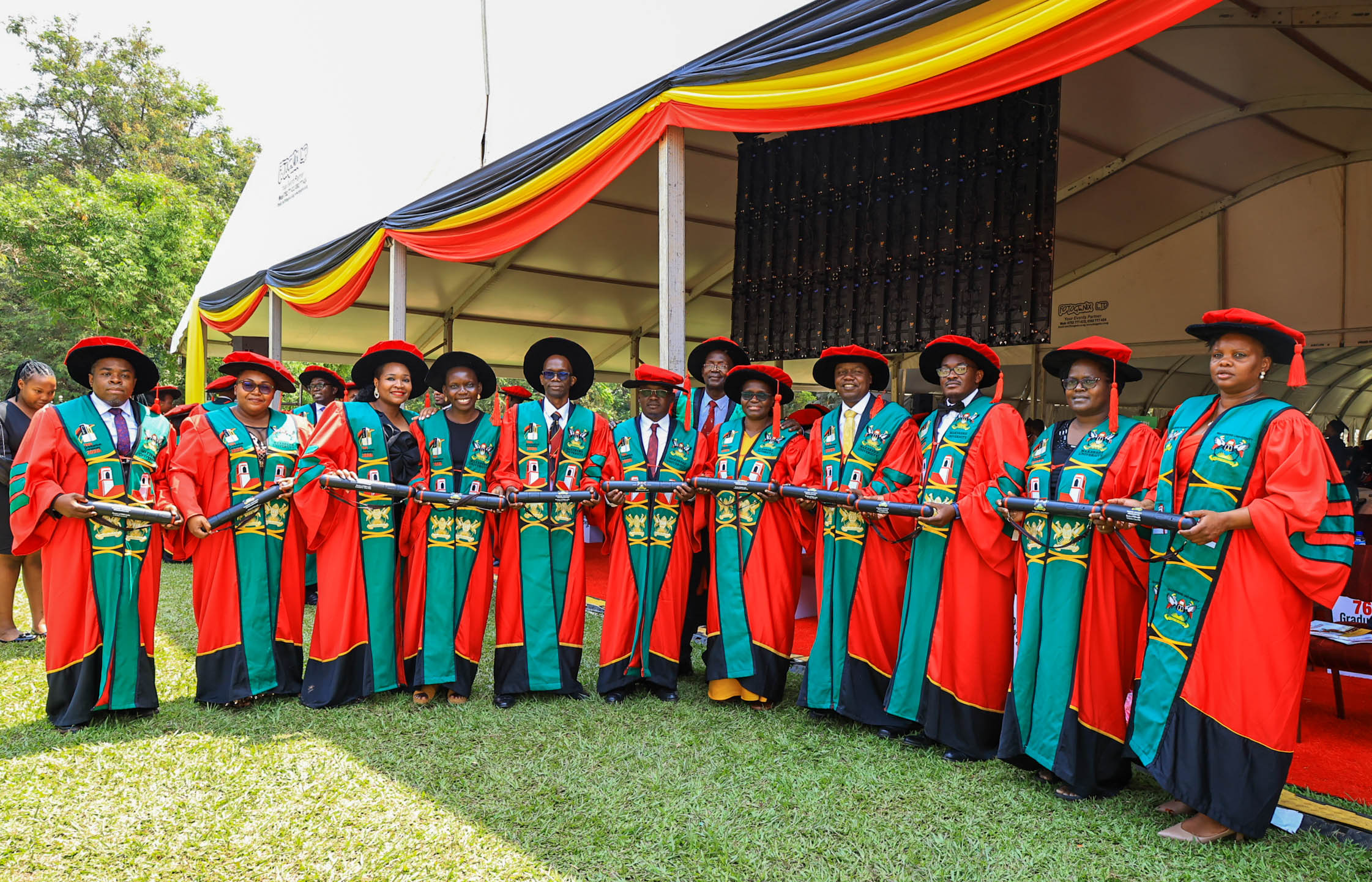
KAMPALA, 25 February 2026 — Higher education must move beyond awarding degrees to producing solutions for national and global crises, speakers said on Wednesday as Makerere University continued its 76th Graduation Ceremony, positioning universities as central actors in strengthening Africa’s public health capacity.
Addressing graduands on Wednesday, February 25, 2026, at Freedom Square, national leaders and university officials framed graduation not as a ceremonial endpoint but as an investment in workforce readiness, research leadership, and evidence-driven governance, particularly at a time when health systems across the continent face growing pressure from pandemics, demographic change, and climate-related risks.
The message resonated strongly through presentations from Makerere University School of Public Health (MakSPH) and Makerere University College of Health Sciences (MakCHS), whose graduates enter professional service amid renewed global attention to health system resilience, scientific leadership, and locally generated research.
Delivering the commencement address on Day Two of Makerere University’s 76th Graduation Ceremony, Dr. Margaret Blick Kigozi, Board Chairperson of the Makerere University Endowment Fund, reflected on her graduation in 1976 during a period of national uncertainty under then-Chancellor President Idi Amin. She recalled leaving Uganda soon after with her young family, carrying “little more than education, values, and hope,” an experience she used to frame lessons on resilience, purpose, and responsibility in uncertain times.
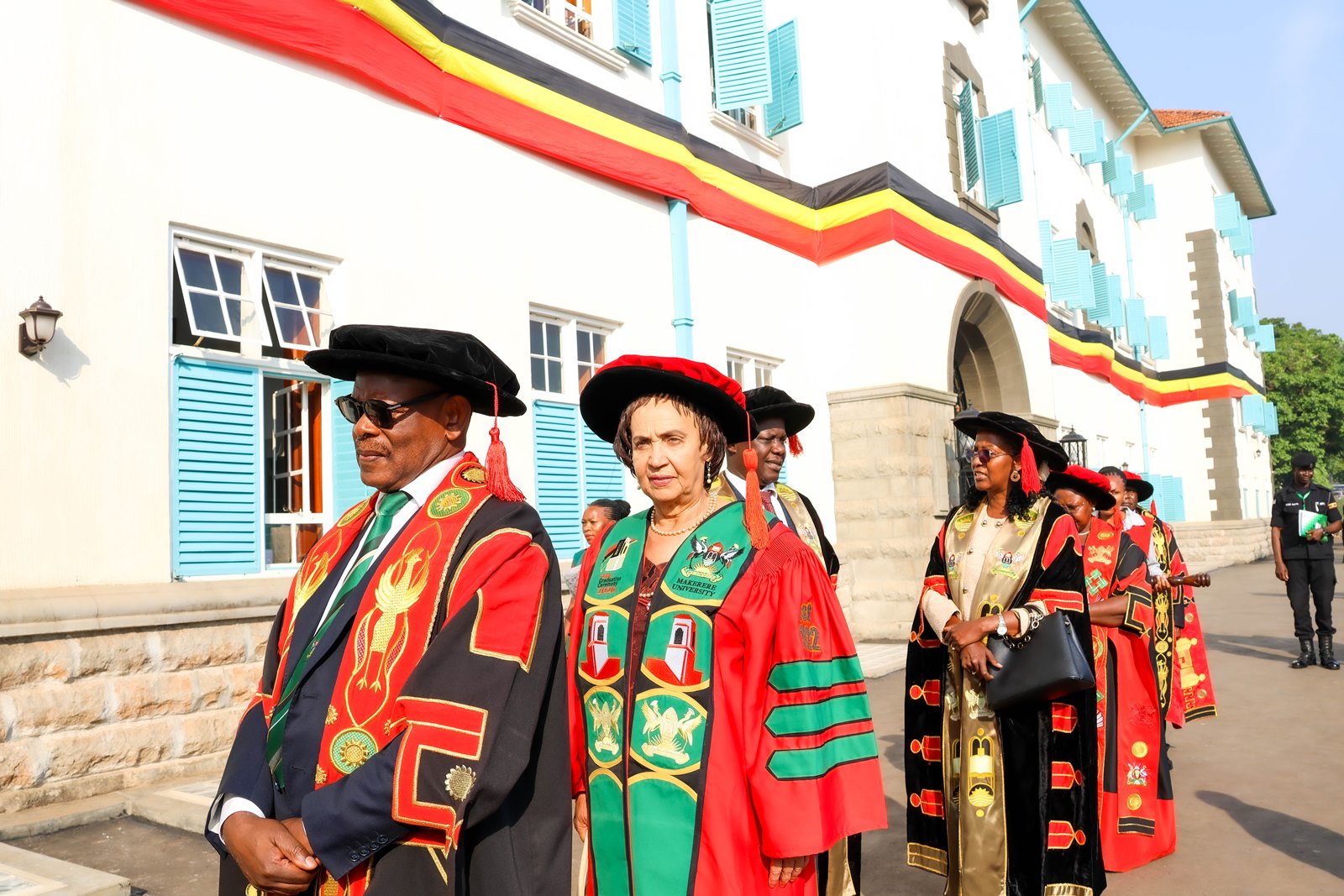
Challenging graduates to rethink professional success, she reminded those entering health and life sciences that their training carries extraordinary influence.
“Power does not make you important; it makes you responsible,” she said. “You will decide who is listened to and who is dismissed, who waits and who is rushed through, who feels safe and who feels small. Your education has trained you to ask better questions, but your humanity must guide the answers. Behind every chart, every case, every experiment, there is life, and life deserves care, patience, and dignity.”
Throughout the ceremony, speakers returned to a common refrain: societies increasingly depend on evidence, and universities must produce professionals capable of translating knowledge into policy, practice, and community impact.
Across the four-day congregation, the University will award 9,295 degrees and diplomas, including 2,503 Master’s degrees, 6,343 Bachelor’s degrees, 206 Postgraduate Diplomas, and 30 Diplomas. But beyond the numbers, speakers repeatedly returned to a central question on how higher education can translate academic growth into national development and health security.
On day two, graduands were presented from the College of Natural Sciences, the College of Veterinary Medicine, Animal Resources and Biosecurity, the College of Health Sciences, and the MakSPH, the latter positioned squarely within Africa’s ongoing struggle to expand its pool of trained epidemiologists, health systems researchers, and policy leaders.
Vice Chancellor Prof. Barnabas Nawangwe noted that Africa averages just 80 researchers per million people, compared to a global average of 1,081, warning that the human resource gap remains substantial.
“Today the School of Public Health presents graduands joining the field at a time when Africa faces a critical shortage of highly trained public health leaders,” he said.
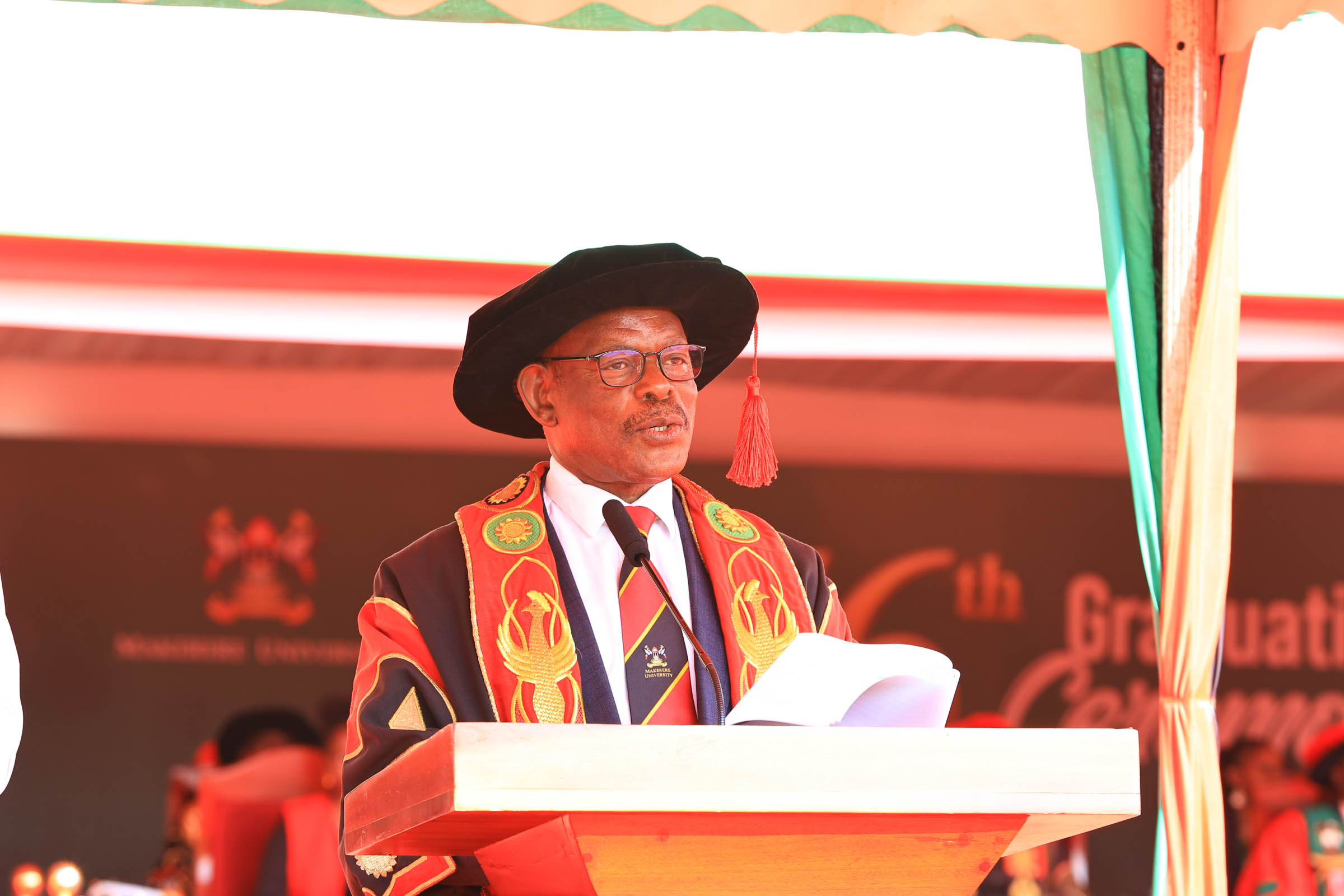
The School of Public Health presented seven PhD candidates: Aber Harriet Odonga, Komakech Henry, Lubogo David, Nakisita Olivia, Namukose Samalie, Ntaro Moses, and Osuret Jimmy. It also graduated 195 Master’s students and 29 Bachelor of Environmental Health Science graduates, including four first-class honours recipients led by Phillip Acaye with a CGPA of 4.63.
Their research spans maternal and child health, epidemic preparedness, sanitation behaviour change, nutrition systems integration, and injury prevention, areas increasingly recognised as foundational to national development rather than peripheral health concerns.
University Chancellor Dr. Crispus Kiyonga emphasized that research must move beyond academic publication into policy and implementation.
“Research plays a very vital role in the development of any community,” he said, linking university scholarship directly to Uganda’s national development agenda.
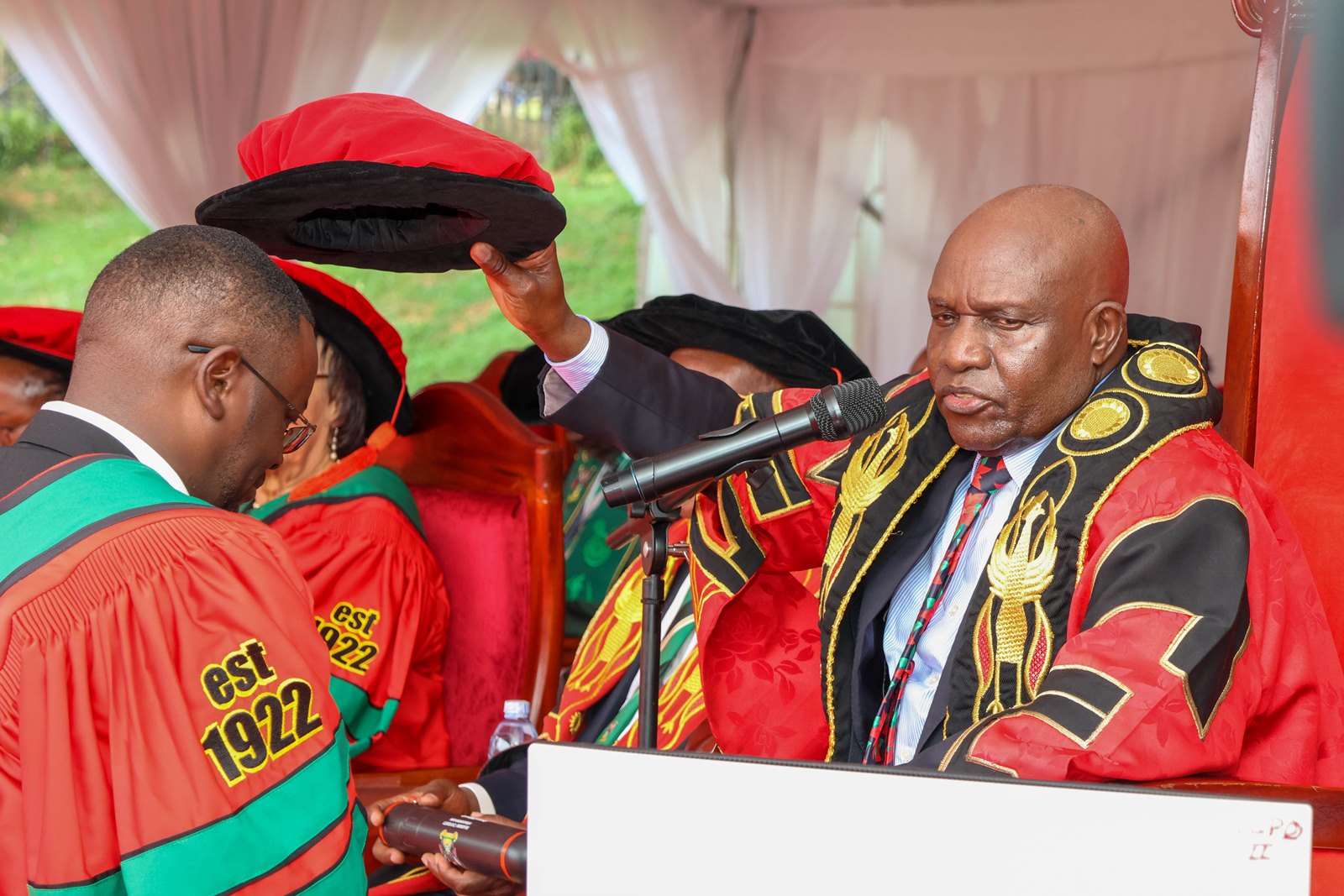
For public health education, that responsibility carries particular urgency. The COVID-19 pandemic, recurring disease outbreaks, and climate-linked health risks have exposed how deeply national stability depends on scientific capacity.
The chancellor hailed the Government of Uganda for committing UGX 30 billion through the Makerere University Research and Innovations Fund (MakRIF).
Mak Urged on More PhDs
Representing the First Lady and Minister of Education and Sports, State Minister Dr. Joyce Kaducu Moriku described doctoral training as central to Uganda’s research ambitions, noting government efforts to expand funding and modernize higher education systems.
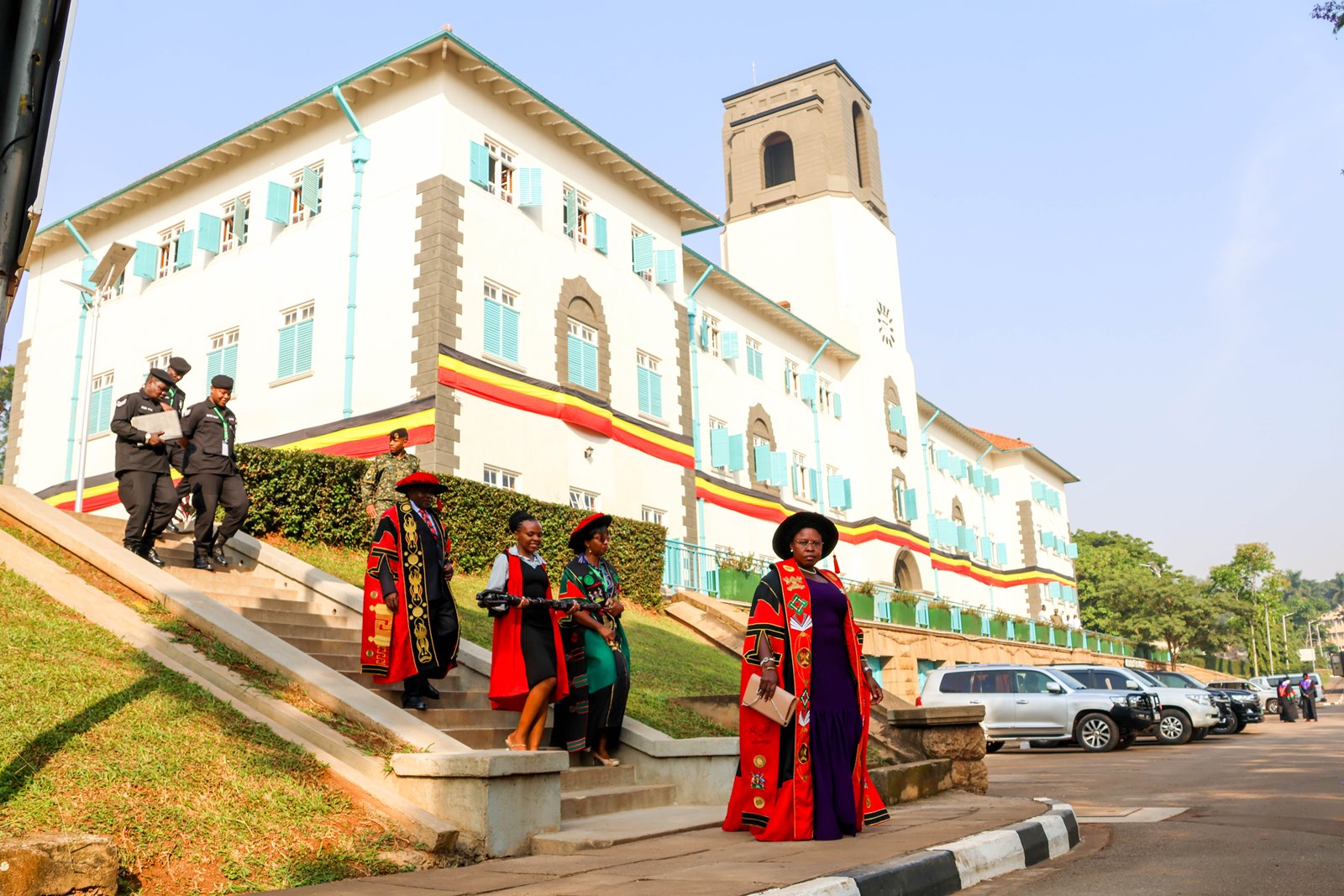
“Universities must produce more PhDs to strengthen the national research agenda,” she said, adding that competence-based reforms aim to align training more closely with societal needs.
“More PhDs also mean the university is growing in academic leadership and an increase in research. So, keep the numbers growing, especially in Science, Technology, and Engineering,” she added.
The 213 PhDs conferred this year, a record, signal more than institutional expansion but a response to structural deficits.
Africa bears approximately 25% of the global disease burden but produces a disproportionately small share of global health research. The continent’s research density remains far below global averages. In this context, each doctoral graduate becomes not merely an academic achievement but a strategic asset.
A University Responding to Its Moment
For the School of Public Health, the graduation reflects a broader evolution in how public health training is conceived. Rather than focusing solely on the treatment of disease, the field increasingly addresses systems, sanitation, nutrition, behavioural change, surveillance, prevention, and climate change, areas where research directly shapes everyday life.
Recent MakSPH-led initiatives, including national HIV impact surveys and digital health system expansion, demonstrate how academic institutions increasingly function as implementation partners to the government rather than observers.
Over the past five years, MakSPH has supported the national scale-up of electronic medical records through the CDC-funded Monitoring and Evaluation Technical Support (MakSPH-METs) programme, and led the Third Uganda Population-Based HIV Impact Assessment (UPHIA 2024–2025), the first fully Ugandan-implemented national survey of its kind.
Launched in 2020, the METs program has supported the nationwide scale-up of UgandaEMR+, transitioning thousands of facilities to secure electronic medical records and deploying critical ICT infrastructure. In March 2026, these systems will be formally transitioned to the Ministry of Health, reflecting sustainable national ownership.
Health
Three MakSPH Faculty Honoured with Makerere University Research Excellence Awards 2026
Published
3 days agoon
March 2, 2026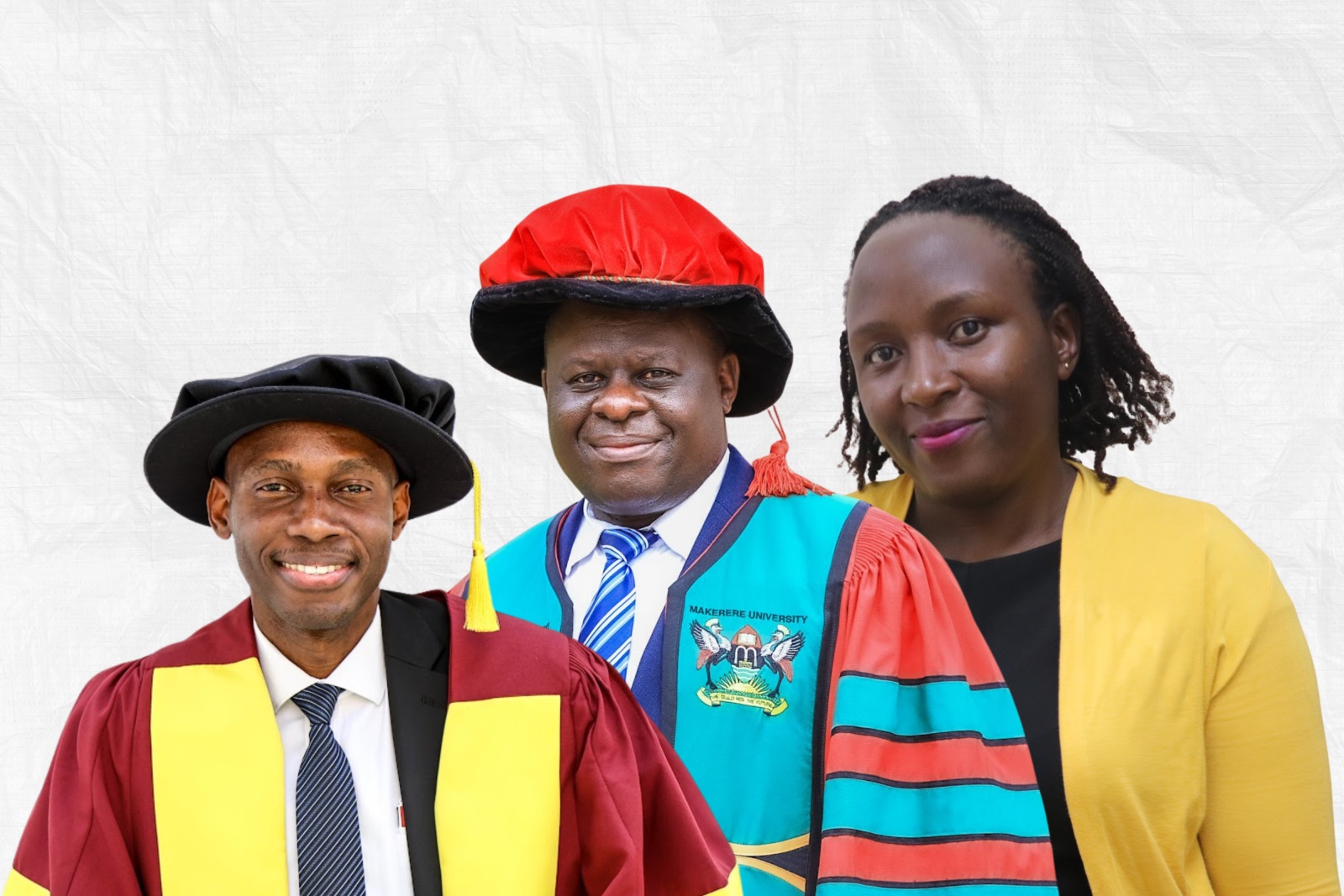
KAMPALA—Three faculty members from Makerere University School of Public Health (MakSPH) have been recognised at the Makerere University Vice-Chancellor’s Research Excellence Awards 2026, highlighting the School’s expanding contribution to research leadership, scientific productivity, and policy-relevant scholarship across Africa.
Associate Professor Peter Kyobe Waiswa, Associate Professor David Musoke, and Juliana Namutundu received honours during the University’s 76th Graduation Ceremony at Freedom Square, where Makerere celebrated scholars whose work has demonstrated exceptional research achievement and impact beyond academia.
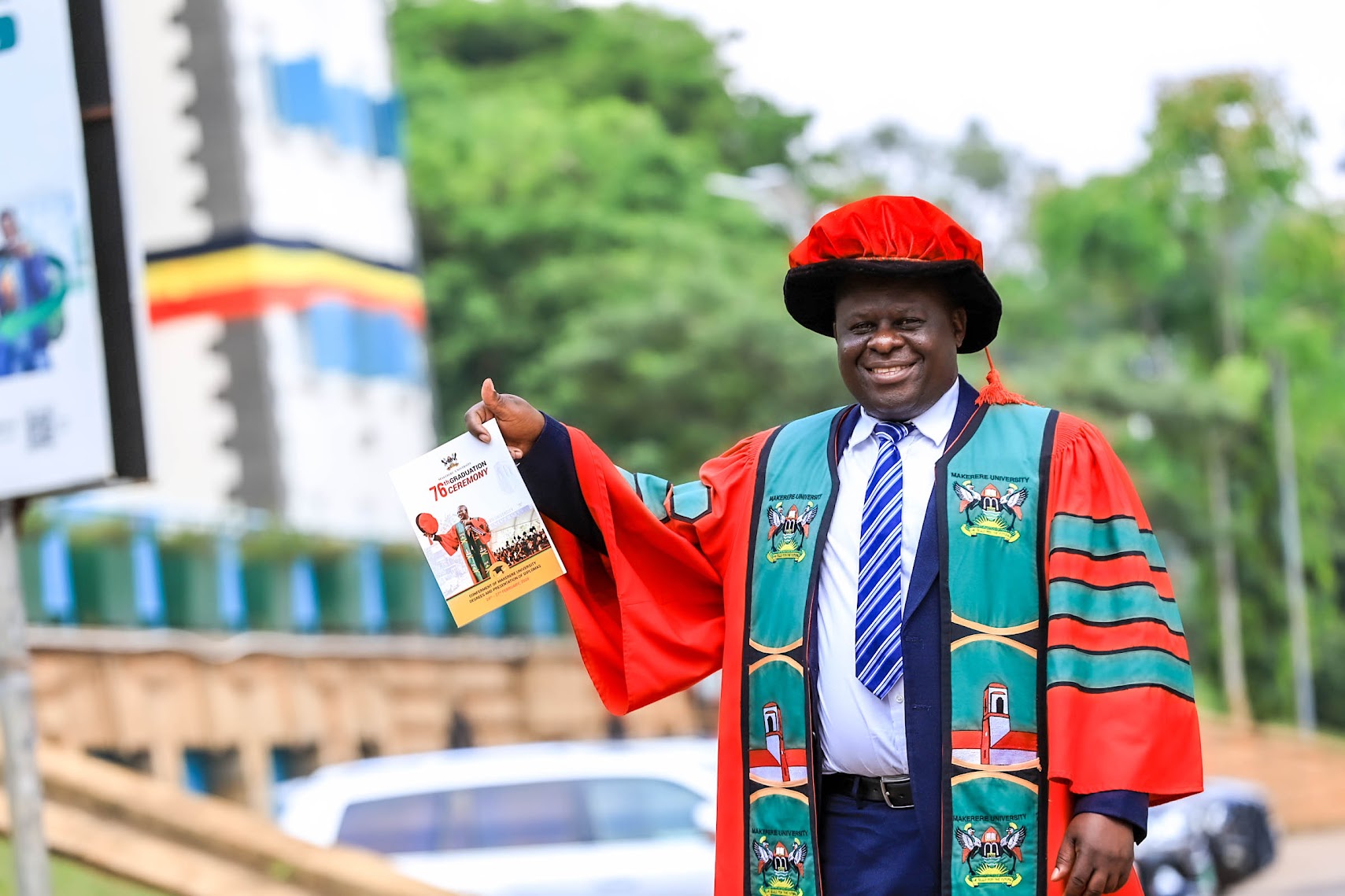
The annual awards, coordinated by the Directorate of Research, Innovation and Partnerships (DRIP), recognise faculty and staff whose scholarly output and leadership advance Makerere University’s ambition to become a research-led institution.
“This recognition celebrates sustained excellence in research productivity and contributions to knowledge that advance both national and global discourse,” Vice-Chancellor Prof. Barnabas Nawangwe said. “We are strengthening a culture where research does not remain confined to journals but translates into solutions for society.”
Among the university’s top researchers was Assoc. Prof. Peter Kyobe Waiswa, a health systems scientist whose work focuses on maternal, newborn, and child health. Waiswa ranked among Makerere’s overall top researchers after publishing 43 peer-reviewed papers in 2025, tying with three-time award winner Prof. Moses Kamya of the School of Medicine in the College of Health Sciences.
His research examines how health systems function at their most fragile moments, including childbirth, early life, and community-level care, addressing questions of equity, service delivery, and health system performance across Africa.
Also recognised was Dr. David Musoke, an Associate Professor of Disease Control, whose 25 publications earned distinction among senior career researchers. His work spans environmental health, community health systems, and implementation research, areas increasingly viewed as critical to preventing disease before it reaches hospitals.
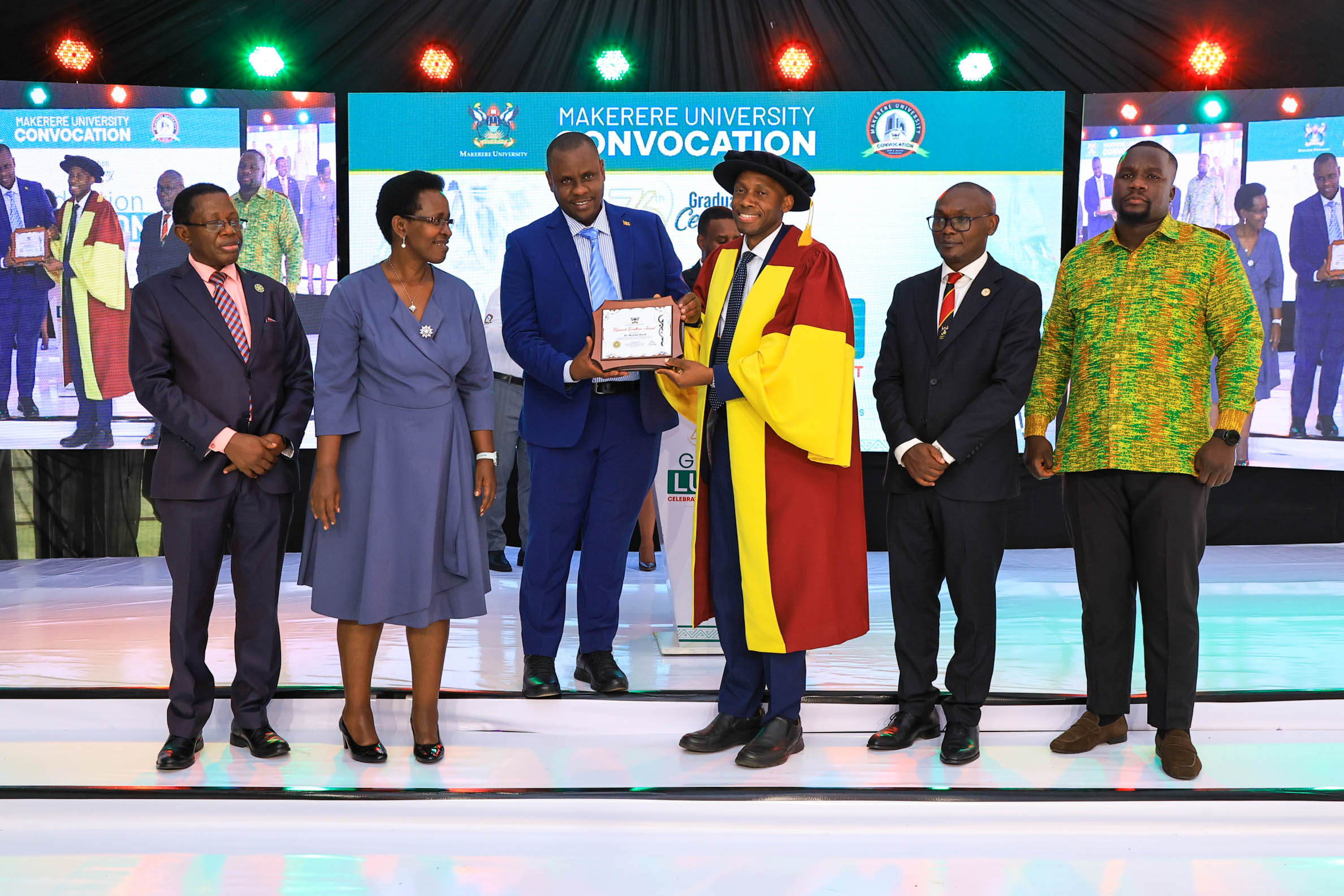
In the early-career category, Juliana Namutundu received recognition for emerging research leadership, reflecting Makerere’s effort to nurture the next generation of African scholars.
Together, the awards underscored MakSPH’s growing influence within Makerere’s research ecosystem, particularly in fields linking science directly to population wellbeing.
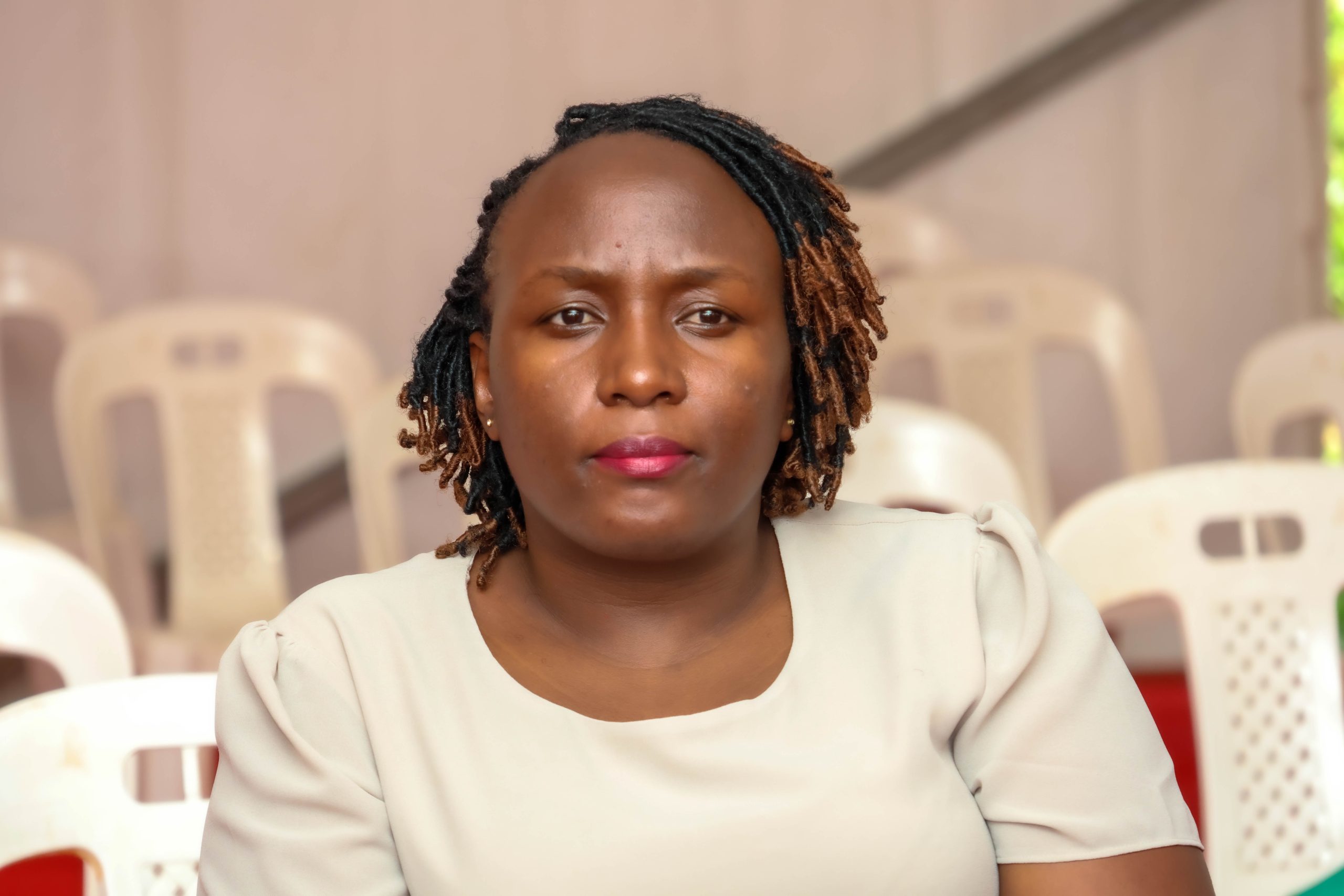
The Research Excellence Awards were established to encourage publication in high-impact journals while reinforcing Makerere’s ambition to become a globally competitive research university. Nominations are reviewed by the Board of Research and Graduate Training, chaired by Deputy Vice-Chancellor (Academic Affairs) Prof. Sarah Ssali.
Awardees were honoured during a graduation luncheon organised by the Makerere University Convocation, the institution’s alumni and staff association, which described the event as a celebration of “excellence and inspiring impact.”
The ceremony also recognised forms of scholarship extending beyond traditional academic publishing.
Dr. Geofrey Musinguzi, a research associate at the School of Public Health, was honoured for his book My Journey with Rectal Cancer, an account of diagnosis, treatment, and recovery that blends personal testimony with public health advocacy.
Diagnosed at age 44 while a visiting scholar at the University of Antwerp in Belgium, Musinguzi sought medical care after experiencing persistent symptoms, including rectal bleeding and back pain. His treatment involved surgeries, chemotherapy, radiotherapy, and a year living with a colostomy bag.
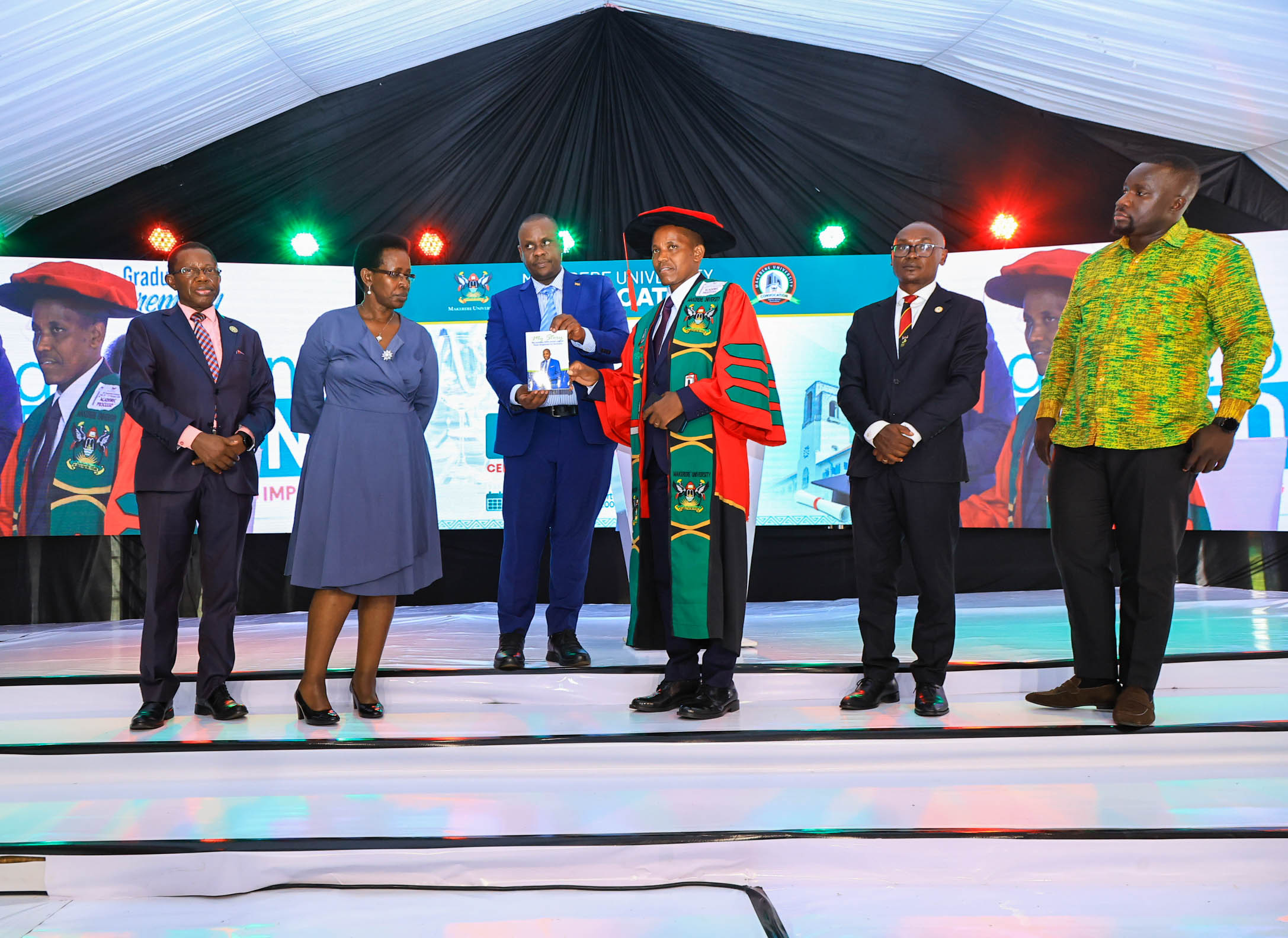
Rather than keeping the experience private, he documented it publicly to challenge cancer stigma and encourage early screening. The book, launched at the School of Public Health in August 2024, highlights how lived experience can shape public health awareness alongside scientific research.
The recognition reflects a broader understanding of research impact, one that includes scholarship capable of influencing behaviour as well as policy.
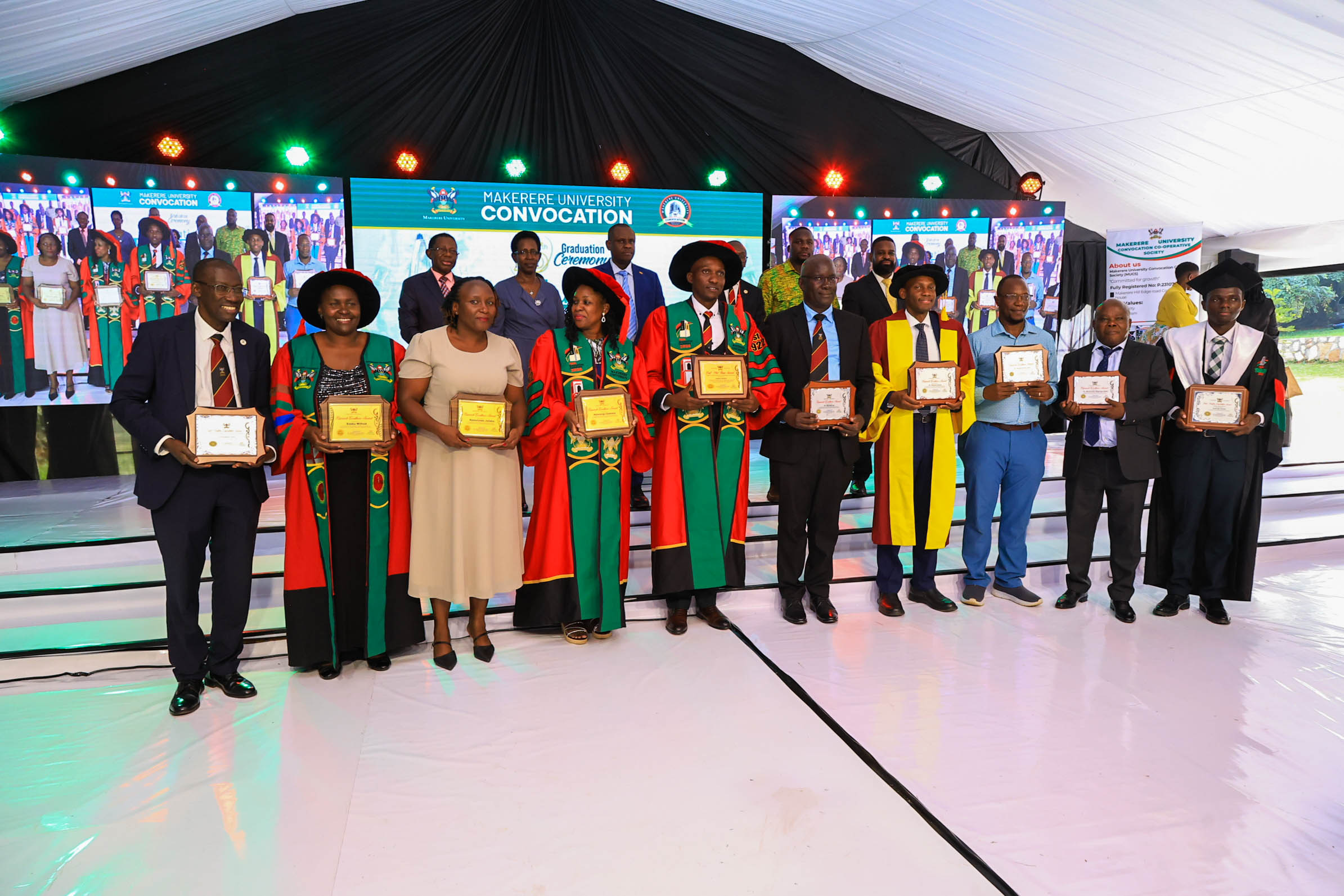
Makerere’s emphasis on research excellence comes as African universities face increasing pressure to produce locally grounded evidence while competing globally for visibility and funding. For MakSPH, whose work spans disease surveillance, environmental health, and health systems research, publication output increasingly serves as both academic currency and development infrastructure.
“These awards are part of our broader effort to position Makerere as a truly research-led institution,” Nawangwe said, adding that scholarship must remain aligned with national and regional priorities.
Health
Makerere’s 76th Graduation Ceremony: CHS showcases research strength with 26 PhD Graduates
Published
7 days agoon
February 26, 2026By
Zaam Ssali
The second day of the Makerere University 76th Graduation Ceremony, held on Wednesday 25th February, marked another proud moment as the institution continues its tradition of academic excellence and national service. Graduands were presented for conferment of degrees and award of diplomas from the College of Health Sciences (CHS), College of Natural Sciences, College of Veterinary Medicine, Animal Resources and Biosecurity and School of Public Health.
The College of Health Sciences presented a total of 746 graduands for conferment of degrees including 26 PhD, 293 Masters, 425 Bachelors and 2 Diplomas. This is a testament to CHS and Makerere University’s contribution in training skilled health professionals and strengthening Uganda’s health systems through education, innovation and research.
Speaking to the congregation, Professor Barnabas Nawangwe – Vice Chancellor, Makerere University welcomed everyone to Day 2 of Makerere University’s 76th Graduation. He congratulated the 9,295 graduands comprising 4,262 (46%) female graduates and 5,033 (54%) male graduands who will be awarded degrees and diplomas through the graduation week; 213 graduands are PhD recipients. He commended the efforts of staff, parents, and sponsors in supporting the students’ journeys.
He reminded the congregation that outstanding researchers were honored on Day 1 of the graduation for excellence in scholarly work and impactful publications, reaffirming the University’ commitment to research productivity and academic distinction. In addition, the Innovation Commercialization Award was also presented, highlighting Makerere’s focus on turning research into practical solutions that address real-world challenges and drive national development.
The Vice Chancellor highlighted the history of the College established in 1924 cognizant of its impact on Uganda’s Health sector and beyond. He said, ‘As the College enters its second century, it is strengthening specialist training to address increasingly complex health challenges’. CHS has introduced fellowship programmes to equip physicians with advanced expertise which are useful in transforming health systems across Uganda and the region. In 2025 alone, 16 fellows graduated in Pediatric Hematology and Oncology, with additional fellowships underway in Newborn Health, Interventional Radiology, Emergency Care Medicine, and Pulmonary and Critical Care Medicine.
Professor Nawangwe also noted the progression of one of the centres of excellence at CHS, the Makerere University Lung Institute (MLI) established a decade ago to address the growing burden of lung disease in Uganda. He said, ‘today, the MLI serves 6,000 patients annually, shapes national policy and has embarked on construction of a new building, signalling a renewed commitment to advancing respiratory health in Uganda and beyond’.
He also reminded the congregation that CHS continues its centennial celebrations, including the upcoming Alumni Dinner Gala on March 6th 2026 to raise funds for refurbishing the iconic Davis Lecture Theatre, culminating in the unveiling of a Centennial Monument later this year.
Professor Nawangwe applauded the steady advancement of Makerere University into a research-led institution, generating knowledge that drives communities, strengthens industries, and advances national transformation.
Professor Maggie Kigozi was the commencement speaker for Day 2. Professor Kigozi, a distinguished alumna reflected on how her time at Makerere University shaped her life, career, and values, recalling her graduation in 1976 during a period of national uncertainty. Forced to leave Uganda soon after with little more than her education and determination, she noted that her Makerere training opened doors across the region, enabling her to serve in leading health institutions in Zambia, Kenya, and Uganda. Addressing the graduands, she emphasized that their Makerere education remains a powerful passport to opportunity and carries with it the responsibility to uphold excellence and integrity wherever they serve.
She urged graduates in the health and life sciences to handle the power of their profession with humility, compassion, and responsibility, reminding them that behind every patient, case, or experiment lies a life deserving dignity. Beyond clinical expertise, she encouraged them to develop business and financial skills to build sustainable health services and create opportunities for others. She also reassured them that failure is part of growth, noting that resilience, continuous learning, and balance in life are essential to meaningful success as they step forward as ambassadors of the Makerere legacy.
Delivering a speech on behalf of the First Lady and Minister of Education and Sports, Janet Kataha Museveni, the State Minister for Primary Education, Hon. Dr. Joyce Moriku Kaducu, said the Government had deliberately deepened investment in higher education to position universities as drivers of national development.
Hon. Kaducu described the establishment of the Makerere University Research and Innovation Fund (RIF) as a major milestone, noting that it supports high-impact research aligned to national priorities and has enabled thousands of researchers to deliver practical solutions benefiting communities across Uganda. She also highlighted Parliament’s approval of a 162 million US dollar concessional loan from the Korea EXIM Bank to upgrade science, technology and innovation infrastructure at Makerere University, including modern laboratories, smart classrooms and advanced facilities for engineering and health sciences, to better prepare students for the Fourth Industrial Revolution.
The Minister announced plans to construct a national stadium at Makerere and other higher education institutions to promote sports development and talent identification. She reiterated the directive for all universities to fully implement Competence-Based Education and Training by July 2027, urging Makerere to lead curriculum reform, staff training and infrastructure development while ensuring satellite campuses meet full accreditation and uphold academic standards, transparency and accountability.
Addressing graduates, Hon. Kaducu encouraged them to become job creators in sectors such as agriculture, infrastructure, healthcare and education, and to leverage opportunities like the Parish Development Model for entrepreneurship. She commended Makerere’s leadership and partners and congratulated the Class of 2026 on their achievement.
In his address to the congregation, Dr. Crispus Kiyonga – Chancellor, Makerere University congratulated graduands upon making it to the 76th Graduation Ceremony of Makerere University. He described their achievement as a milestone in both personal growth and national development, urging them to apply their knowledge creatively to benefit society. He acknowledged the contribution of academic staff, administrators, the University Council, and expressed gratitude to the Government of Uganda and President Yoweri Kaguta Museveni for continued support.
Dr. Kiyonga called on the university community to strengthen research, expand private sector partnerships, and leverage technology to address Uganda’s development challenges. Emphasising research as central to national progress, Dr. Kiyonga noted the Government’s UGX 30 billion investment annually in the Makerere University Research and Innovation Fund (MakRIF) and praised the Science, Technology and Innovation Secretariat, Office of the President for supporting initiatives at the University advancing homegrown solutions to national challenges. He also highlighted a strengthened partnership with the Korean government, securing a USD 162 million loan from the Korea Exim Bank to boost infrastructure and staff capacity.
While acknowledging limited formal employment opportunities, he encouraged graduates to innovate and create jobs. He further commended the university’s digitalization efforts and outlined four priorities: increased research funding, private sector collaboration, community engagement, and effective use of technology.
During the 76th graduation ceremony running from the 24th -27th February, 2026, a total of 9,295 graduands will be awarded degrees and diplomas in various disciplines. Of these, 213 will receive PhDs, 2,503 Masters Degrees, 206 postgraduate Diplomas, 6343 Bachelor’s Degrees and 30 Diplomas. 46% of the graduands are female and 54% are male.
Trending
-

 Humanities & Social Sciences1 week ago
Humanities & Social Sciences1 week agoMeet Najjuka Whitney, The Girl Who Missed Law and Found Her Voice
-

 General1 week ago
General1 week ago76th Graduation Highlights
-

 Agriculture & Environment2 weeks ago
Agriculture & Environment2 weeks agoUganda Martyrs Namugongo Students Turn Organic Waste into Soap in an Innovative School Project on Sustainable Waste Management
-

 Health2 weeks ago
Health2 weeks agoMakerere University School of Public Health Graduates First Cohort of Cost-Effectiveness Analysis Short Course
-

 Agriculture & Environment1 week ago
Agriculture & Environment1 week agoCAES Presents Overall Best Performing Student in the Sciences & a Record 28 PhDs at the 76th Graduation Ceremony
